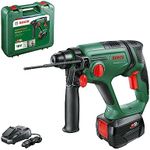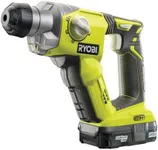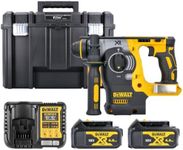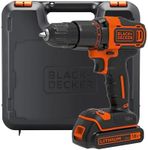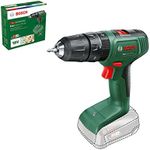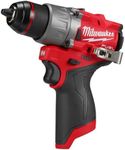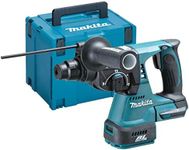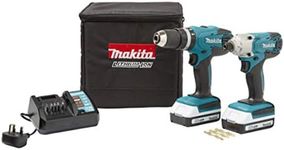Buying Guide for the Best Cordless Hammer Drills
Choosing the right cordless hammer drill can make a significant difference in your DIY projects or professional work. A cordless hammer drill combines the convenience of a cordless drill with the power of a hammering action, making it ideal for drilling into hard materials like concrete and masonry. To find the best fit for your needs, consider the following key specifications and understand how they impact performance and usability.Battery VoltageBattery voltage determines the power of the cordless hammer drill. Higher voltage batteries (18V or 20V) provide more power and are suitable for heavy-duty tasks, while lower voltage batteries (12V) are lighter and better for light-duty tasks. Choose a higher voltage if you need to drill into tough materials frequently, and a lower voltage for occasional use or lighter materials.
Battery Capacity (Ah)Battery capacity, measured in ampere-hours (Ah), indicates how long the battery will last on a single charge. Higher Ah batteries (4Ah or more) offer longer runtime, which is crucial for extended projects. Lower Ah batteries (2Ah or less) are lighter and may be sufficient for shorter tasks. Consider your typical project duration to decide the right capacity.
Hammering Rate (BPM)Hammering rate, measured in beats per minute (BPM), shows how many times the hammer action occurs per minute. Higher BPM (over 30,000) means faster drilling into hard materials. Lower BPM (under 20,000) is adequate for softer materials. If you often work with concrete or masonry, opt for a higher BPM.
Max Drilling CapacityMax drilling capacity indicates the maximum diameter of holes the drill can make in different materials. This is usually specified for wood, metal, and masonry. Larger capacities are better for heavy-duty tasks, while smaller capacities are suitable for lighter work. Match the capacity to the types of materials and hole sizes you typically need.
Speed SettingsSpeed settings refer to the number of different speeds the drill can operate at. Multiple speed settings allow for greater control and versatility, enabling you to adjust the speed based on the material and task. If you need precision and flexibility, look for drills with multiple speed settings.
Chuck SizeChuck size determines the maximum diameter of drill bits the drill can hold. Common sizes are 1/2 inch and 3/8 inch. Larger chucks (1/2 inch) can accommodate bigger bits, which is useful for heavy-duty drilling. Smaller chucks (3/8 inch) are lighter and suitable for general-purpose use. Choose based on the bit sizes you frequently use.
WeightWeight affects the ease of handling and fatigue during use. Heavier drills are more stable and powerful but can be tiring to use for extended periods. Lighter drills are easier to maneuver and better for overhead or prolonged tasks. Consider your strength and the nature of your projects when choosing the weight.
ErgonomicsErgonomics refers to the design and comfort of the drill. Features like a comfortable grip, balanced weight distribution, and easy-to-use controls can make a big difference in usability. If you plan to use the drill frequently or for long periods, prioritize ergonomic designs to reduce strain and improve efficiency.


